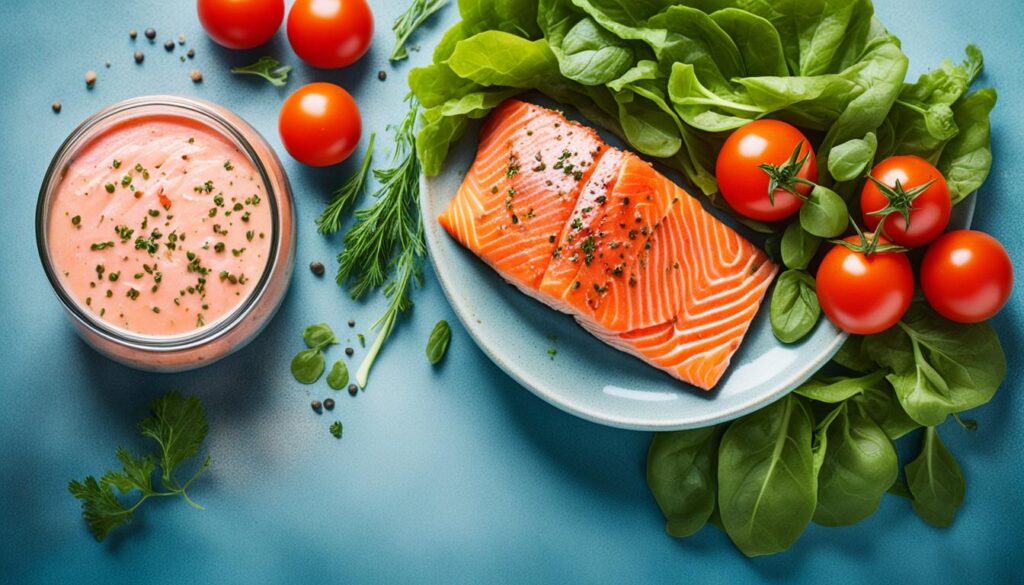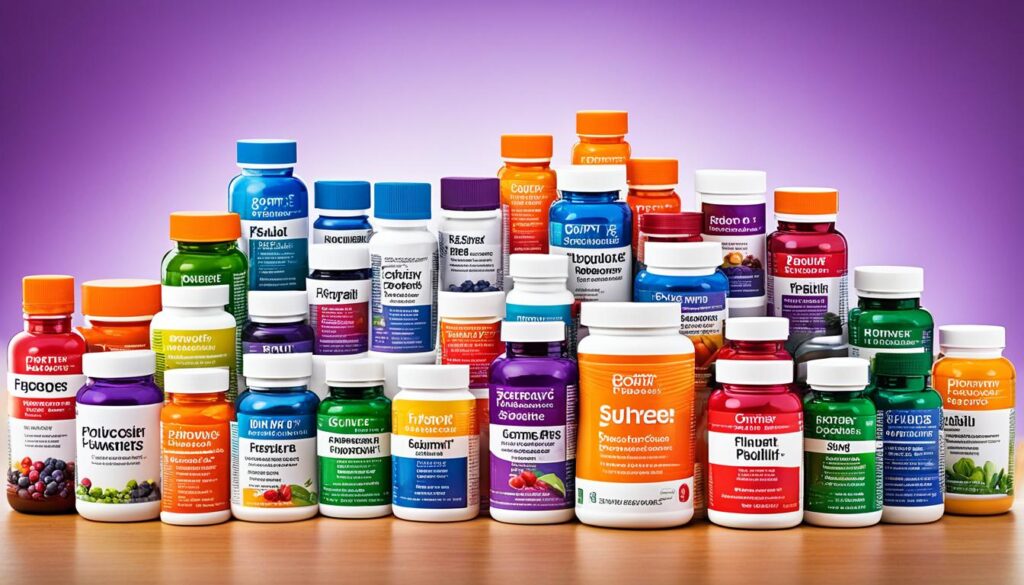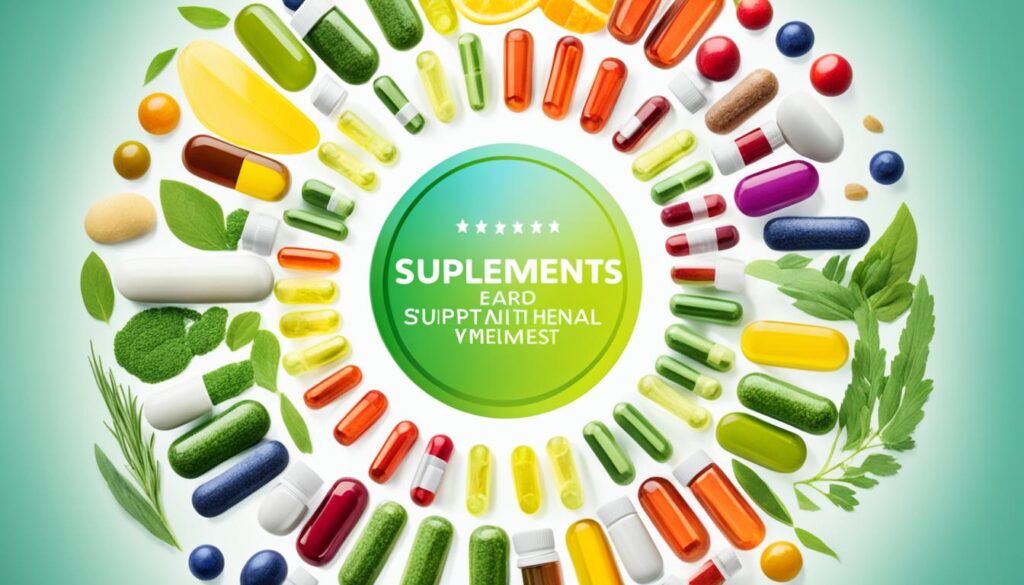Did you know a lot of people in the United States use supplements? These are extra nutrients like vitamins, minerals, and herbs. People take them to stay healthy.1 In this guide, we’ll look at how supplements can make your health better.
Supplements can have many ingredients like vitamins, minerals, and herbs. They are sold in different ways, such as tablets, gummies, and powders. So, you can easily find what you like.2 Some well-liked supplements are vitamin D, calcium, probiotics, and fish oils.1
Most people don’t eat perfectly every day. Supplements can help fill nutrient gaps if your diet isn’t always the best.1 They can also do some special things, like help your bones, lower blood pressure, and even prevent certain problems in babies.1
Remember, supplements can’t take the place of eating well. They help when used with good food and exercise.1 Also, the FDA doesn’t check if all supplements really work. So, look into them and talk to your doctor before starting anything new.2
Key Takeaways
- Dietary supplements can provide essential nutrients that may be lacking in your diet, supporting overall health and well-being.
- Supplements come in a variety of forms, including vitamins, minerals, herbs, probiotics, and more, allowing you to find the right products for your specific needs.
- Certain supplements, such as calcium, vitamin D, and folic acid, have been associated with targeted health benefits, like improved bone density and reduced risk of birth defects.
- Supplements should be used responsibly and in conjunction with a balanced, nutritious diet, as they cannot replace the benefits of whole, unprocessed foods.
- Consulting with healthcare professionals can help ensure you choose high-quality supplements and use them in a way that supports your overall health and wellness.
Understanding the Role of Supplements
Dietary supplements add to what you already eat.3 They are not meant to be drugs. They don’t cure or prevent illnesses. They help fill the gap for nutrients like vitamins, minerals, and herbs that you might not get enough of.
What Are Dietary Supplements?
Supplements are sold in many forms, like pills, gummies, powders, and more.3 Inside, you might find vitamins, minerals, and other beneficial substances. They can be useful for your health in many ways.
Why Do We Need Supplements?
If your diet lacks certain nutrients, supplements can help.3 They’re great for making sure you get enough essential elements. But remember, they’re not food. A healthy diet is the key.
4 Over half of the U.S. takes supplements now and then. The most common ones include multivitamins and vitamins such as B, C, and D. Calcium is also very popular.

Vitamins: Essential for Wellbeing
Vitamins are key for our health and well-being.5 They are like small but powerful helpers for our body. Micronutrients, including vitamins and minerals, are vital for health. We must get them from our food.5 There are two types of vitamins: fat-soluble (A, D, E, K) and water-soluble (C, B-complex).5 The body doesn’t store water-soluble vitamins, making regular intake important.
Water-Soluble Vitamins
Water-soluble vitamins like C and the B-complex group are easy for the body to use.6 About 15 percent of people lack enough vitamin B12.7 For vitamin C, men 19 years and older need 90 mg a day, while women need 75 mg. Because the body gets rid of these vitamins quickly, we need them every day.
Fat-Soluble Vitamins
The body can store fat-soluble vitamins A, D, E, and K in fat and the liver.6 If you avoid the sun or always wear sunscreen, you might need more vitamin D.6 Postmenopausal women who don’t eat dairy might need extra calcium.6 Vegetarians should get plenty of iron since they need more than meat-eaters.6 Older adults and those with diabetes might need magnesium.6 Zinc supplements could be necessary for vegetarians because there’s less zinc in plants than in meat and fish. These vitamins are vital for strong bones, fighting off sickness, and keeping our bodies running smoothly.
It’s crucial to get enough of all vitamins through our diet. If we can’t, supplements can fill the gap. Both water-soluble and fat-soluble vitamins are important for our health and well-being.

Minerals: Building Blocks of Life
Minerals are key inorganic compounds our bodies require in small amounts for proper functioning. They are vital for health, aiding in bone strength, immune system health, and much more.8 The body needs over 30 vitamins and minerals each day. These help make skin, muscle, bones, and even nerve signals possible.8
Important minerals like calcium, iron, and magnesium are known to us all. The body needs some minerals, like calcium, in larger quantities. This is for our health’s best interest.8 Others, such as chromium and zinc, are just as critical but in smaller amounts. They work in enzyme systems and help with energy production.9
A good mineral intake from our foods or supplements is essential. This keeps us strong and avoids health issues.8 Lacking minerals like magnesium, iron, or calcium can lead to problems. These can affect energy, blood health, and bone strength.9 Adults often need between 310-400mg of magnesium a day and 18mg of iron for women. Men over 18 need only 8mg of iron. Adults should aim for 150ug of iodine daily.9
Foods like eggs, beef, and lentils are rich in iron. They support our blood and keep oxygen moving well.9 For iodine, seafood, sea salt, and oysters are excellent choices. They help with metabolism and keep us healthy.9 Our bodies also need lots of calcium. Dairy, tofu, and nuts provide it, helping our bones, muscles, and cells.9 Modern farming has made magnesium harder to get from our food. So, magnesium supplements are more important now.9

Antioxidants: Protecting Our Cells
Antioxidants are essential for protecting our cells from harm by free radicals.10 These free radicals form from things like exercising, smoking, pollution, and sunlight.1011 If not countered, they can lead to many health problems.
Role of Antioxidants
By neutralizing free radicals, antioxidants prevent oxidative stress.1011 They are crucial for maintaining good cellular health. With a variety of antioxidant sources, they bolster the body’s natural defenses. This supports overall health.10
Sources of Antioxidants
Common antioxidants include vitamins C and E, plus carotenoids and polyphenols. They are in many plant foods like fruits, veggies, and herbs.101112 Eating these foods lowers the risk of heart disease and certain cancers.1112
To get enough antioxidants, include a variety of colorful foods in your meals. Think broccoli, kale, and berries.101112 Supplements might help too. But, talk to a doctor first for the right advice.1112

Probiotics: Gut Health Guardians
Probiotics are live bacteria and yeasts that boost our health, especially our gut health. They help keep our gut’s good and bad bacteria in balance. This balance is key for good digestion, absorbing nutrients, and a strong immune system.13 The benefits of probiotics are wide-ranging. They include supporting our immune system, reducing inflammation, and helping us manage our weight.13
Benefits of Probiotics
Probiotics are vital for our well-being. They maintain the right balance of friendly bacteria in our guts. This balance is important for fighting off and recovering from diarrhea, especially after taking antibiotics.13
They also help with heart health by lowering “bad” LDL cholesterol and blood pressure.13 And, probiotics might even make us feel better mentally, aiding with depression, anxiety, and stress. This link between gut and mental health is promising.13
Yogurt is a well-known probiotic-rich food because of its “live and active cultures.”13 Kefir, a fermented milk drink, unpasteurized sauerkraut, tempeh, and kimchi are also great sources.13
Choosing the Right Probiotic
Picking the right probiotic supplement matters. Look for high-quality strains that meet your specific health needs. Choose products with a billion or more live bacteria (CFUs) for daily use.13 Gut Guardian Supreme™ is one example, offering a potent 50 billion CFUs up to the best by date.14
Adding probiotics to your diet can enhance your overall health. This is true whether through foods or quality supplements.131514

Omega-3 Fatty Acids: Essential Fats
Omega-3 fatty acids are essential for our bodies but we can’t make them ourselves. They are key for heart health, brain function, and fighting inflammation.16
Benefits of Omega-3s
Fish oil, rich in omega-3s, can protect us from heart diseases and lower the chance of blood clots. It also improves good cholesterol and helps lower blood pressure.16
Getting enough omega-3s is vital for good health. You can eat fatty fish or take a supplement. The NIH advises 1-1.5 grams of omega-3s daily for a healthy diet.17 Eating fish high in DHA and EPA is also beneficial, aim for at least twice a week.17
Salmon, herring, and tuna are great fish sources of omega-3s. For plant-based, try flaxseed and walnuts.16 Walnuts, flaxseed oil, and some oils from soybeans are also good for vegans.17
Care is needed with omega-3 supplements. They can cause indigestion, gas, or headaches. The FDA notes that getting omega-3s from food is preferred over supplements.17
Whether from food or supplements, getting enough omega-3s is important. It helps keep us healthy.1617

Supplements for Active Lifestyles
For those who are always on the move, some supplements can offer extra help.18 Proteins like whey, casein, or plant-based ones can aid in building and repairing muscles. This is great for anyone doing strength or endurance training.18 Pre-workout supplements with ingredients like caffeine and amino acids boost focus and energy. They’re perfect for pushing through tough workouts.
These kinds of supplements really make it easier for athletes and fitness fans to perform better and recover faster.
Protein Supplements
18 Protein plays a key role in growing and maintaining muscles, especially with regular exercise.18 SolgarⓇ Whey to GoⓇ Protein Powder makes sure muscles get the amino acids they need for top performance.
Pre-Workout Supplements
18 B-complex vitamins are essential for turning food into energy for your workouts.18 SolgarⓇ B-Complex “100” has all eight vitamins. It works for everyone, no matter their eating rules.
19 Taking Vitamin D3, Omega-3, Bone Care, and Vitamin C with exercise and a good diet can boost your active life. It’s a winning combo.
20 Athletes who watch what they eat might not get enough vitamins and minerals.20 B vitamins are especially important for making energy and keeping the nervous system in shape for those who work out a lot.20 Using daily multivitamins helps make up for what could be missing from their food, keeping them healthy and full of energy.

supplements – health
Supplements help support our health and well-being.1 They are not a replacement for a healthy, balanced diet. Still, they can fill nutritional gaps. They also offer extra support for specific health goals.21
There are many types of supplements, including vitamins, probiotics, and omega-3 fats. They can boost your immune system, improve gut health, increase energy, and sharpen your mind.1 It’s important to use them wisely, with advice from doctors or nutrition experts. This way, they can help you feel your best.

Next, let’s focus on what certain people need.21 For example, if a woman plans to get pregnant, the CDC says she should take 400 mcg of folic acid daily.21 Most women under 50 and men need more fiber in their diet. But only a small percentage gets enough.21 The FDA advises on the daily intake for omega-3s, like EPA and DHA.21 Glucosamine and chondroitin are popular for joint health, even if their benefits are debated.21 Oranges and red peppers are excellent natural sources of vitamin C. They provide over 150% of what you need each day.
Melatonin is good for short-term sleep problems.21 Not everyone gets the right amount of magnesium from food, so interest in supplementation is high.21 Turmeric’s curcumin is safe up to 8 grams a day.21 Certain groups, like vegetarians and people over 50, might need supplements to up their B12.21
Many Americans use supplements to add missing nutrients to their diet.1 Popular ones are calcium, iron, and vitamins D and C.1 They can have big health benefits, like stronger bones or preventing birth defects.1
Iron and folic acid are crucial for pregnant women.1 They can help prevent anemia and certain birth defects.1 Fiber supplements assist with constipation and lower bad cholesterol.1 But it’s better to get your nutrients from food whenever possible, rather than supplements alone.1
If a supplement causes problems, like side effects, stop using it and get medical help.1 They may not mix well with medicines or other supplements.1 Serious issues, like severe stomach pain or breathing troubles, need immediate attention.1
In 1994, DSHEA changed how the FD&C Act dealt with dietary supplements.22 The FDA watches over supplements after they’re on the market. This is because companies can sell them without FDA approval.22
Supplement packages must show what’s inside, how much to take, and what benefits it offers.22 Companies must tell the FDA if someone gets very sick from their supplement. They have to do this within 15 days of hearing about it.22 If a supplement makes you sick, letting the FDA know could protect others.22
Age-Specific Supplement Needs
Supplement needs change with age. For example, prenatal supplements are key for pregnant women or those planning to be. They ensure the baby and mother get all the nutrients needed for growth.
Prenatal Supplements
Prenatal supplements provide the extra nutrients needed in pregnancy. They contain more folic acid, iron, and calcium. It’s important to talk to a healthcare professional to pick the right supplement for you.
Supplements for Older Adults
As we age, our bodies absorb certain nutrients less. That’s why calcium, vitamin D, and B12 are crucial for older adults. They help keep bones strong, the mind sharp, and overall health good.23
Women over 50 need 1,200 mg of calcium daily. Men over 51 should also get 1,200 mg, up from 1,000 mg before age 71. They shouldn’t go over 2,000 mg daily. For Vitamin D, those ages 51-70 need 600 IU, while those above 70 should get 800 IU each day. Don’t take more than 4,000 IU daily.23
For Vitamin B12, 2.4 mcg is the daily recommendation. If you take acid reflux meds, you may need a different B12 form.23 Also, take 1.7 mg of Vitamin B6 daily if you’re a man, or 1.5 mg if you’re a woman. This helps your body make enough red blood cells.23
Talking to a healthcare provider is the best way to figure out what you need. They can suggest the right vitamins and doses for you. Older adults often need more vitamins and minerals than younger adults to stay healthy.23

Choosing High-Quality Supplements
Selecting dietary supplements is important. Choose products from trusted brands. Be sure to read the labels. They show what’s inside and if there are harmful extras.24
Reading Supplement Labels
Look at the labels for what nutrients and how much of them are in the supplement. Also, check for any extra ingredients. Choose products that are certified by third parties for their purity and quality. NSC, USP, and ConsumerLab certifications are good signs.252426
Consulting Healthcare Professionals
Talking to healthcare pros is a good idea. They can help you pick the right supplements for you. They consider your health, goals, and any meds or health issues. Doctors, pharmacists, or dietitians can offer advice.2426
Research and choose your supplements wisely. This will help make sure you’re putting your health first.

Conclusion
Adding supplements to your daily routine is a great way to boost your health and well-being. There is a big variety, from vitamins and minerals to probiotics and omega-3s. These dietary supplements help bridge the gap in our nutrition, meet specific health goals, and improve how our bodies and minds work.27 They work best when part of a healthy diet, enough exercise, and taken wisely. This way, you can really lift your health and wellness.
Choose your nutritional supplements carefully, focusing on trusted brands. Also, talk to healthcare experts to make sure your choices fit your unique health needs.28 Being smart and involved in picking supplements helps you get the most from them. It leads to better health and vitality.
Supplements can play a key role in your well-being journey, but they are not everything. Always remember, they are there to aid a good diet and exercise, not to replace them.29 By adding supplements the right way, you can boost your wellness and help your body stay strong and healthy.
FAQ
What are dietary supplements?
Why do we need supplements?
What are the different types of vitamins?
What are the important minerals?
What are antioxidants and why are they important?
What are probiotics and how do they benefit our health?
What are the benefits of omega-3 fatty acids?
How can supplements support active lifestyles?
How do age and stage of life affect supplement needs?
How can I choose high-quality supplements?
Source Links
- https://www.health.com/supplements-7775481
- https://www.healthline.com/health/nutrition/dietary-supplements
- https://ods.od.nih.gov/factsheets/WYNTK-Consumer/
- https://newsinhealth.nih.gov/2013/08/should-you-take-dietary-supplements
- https://www.hsph.harvard.edu/nutritionsource/vitamins/
- https://www.mygnp.com/blog/essential-vitamins-and-minerals/
- https://health.clevelandclinic.org/which-vitamins-should-you-take
- https://www.helpguide.org/harvard/vitamins-and-minerals.htm
- https://canprev.ca/minerals-the-building-blocks-of-your-health/
- https://www.hsph.harvard.edu/nutritionsource/antioxidants/
- https://www.eatright.org/health/essential-nutrients/vitamins/antioxidants-protecting-healthy-cells
- https://www.mayoclinic.org/healthy-lifestyle/nutrition-and-healthy-eating/in-depth/add-antioxidants-to-your-diet/art-20546814
- https://www.mavyn.com/blog/probiotics-guardians-of-gut-health
- https://www.beeyoutiful.com/products/gut-guardian
- https://feelgoods.co/products/gut-guardian
- https://my.clevelandclinic.org/health/articles/17290-omega-3-fatty-acids
- https://www.webmd.com/healthy-aging/omega-3-fatty-acids-fact-sheet
- https://www.solgar.com/blog/lifestyle/supplements-active-lifestyle/
- https://www.vegetology.com/blog/the-best-supplements-for-supporting-an-active-lifestyle
- https://www.naturemade.com/blogs/health-articles/supplements-to-support-a-healthy-active-lifestyle
- https://www.webmd.com/vitamins-and-supplements/ss/slideshow-supplements-myths-facts
- https://www.fda.gov/consumers/consumer-updates/fda-101-dietary-supplements
- https://www.nia.nih.gov/health/vitamins-and-supplements/dietary-supplements-older-adults
- https://www.innovativehealthclinic.com/functional-medicine-weston/how-to-choose-safe-high-quality-dietary-supplements/
- https://www.healthline.com/nutrition/how-to-choose-high-quality-vitamins-and-supplements
- https://www.webmd.com/diet/how-to-evaluate-vitamins-supplements
- https://www.nutraingredients-usa.com/Article/2019/04/10/Experts-take-issue-with-researchers-conclusion-that-supplements-don-t-prevent-death
- https://www.ncbi.nlm.nih.gov/pmc/articles/PMC8431076/
- https://www.safemedication.com/pharmacist-insights/2021/using-dietary-supplements-wisely
